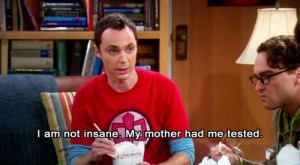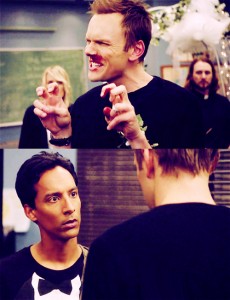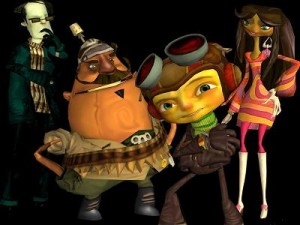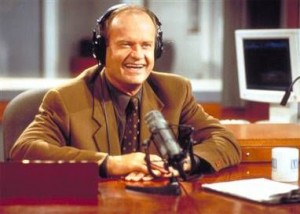Welcome back, Overthinkers! In our last mind-melting episode, we discussed the use of mental illness as a trope in popular culture, focusing specifically on Multiple Personality Disorder in the novel/movie Fight Club, and in the character of Legion from Marvel’s X-Men comics.
Today (or whenever you’re reading this…although I guess that would also be “today” for you even if you are reading this IN THE FUTURE!) let’s look at some other stuff!
So there are these two sitcoms. One is network television’s most popular comedy, and the other is a cult favourite rife with network drama and constantly on the edge of cancellation. And they both feature, as their most beloved character, young men who are portrayed as being…not quite right. I refer, of course, to Family Matters and ALF.

No, just kidding. Obviously I mean The Big Bang Theory and Community. Dr. Sheldon Cooper of Big Bang is a scientific genius, vastly socially inept, asexual, and a major science fiction and fantasy nerd. Community’s Abed Nadir is utterly obsessed with pop-culture to the exclusion of almost everything else, displays very low affect and difficulty recognizing social cues, but is fun-loving and often displays a childlike sweetness. The thing about both Sheldon and Abed is that they are characterized—though never explicitly described—as having Asperger Syndrome, or at least being somewhere along what’s known as the autism spectrum.
The fact that it’s never actually stated that these two characters have any clinically specific disorders is somewhat important. In contrast with Legion, say, who had been variously described as suffering from Schizophrenia, Autism, and most recently Multiple Personality Disorder, having no official diagnosis frees the shows’ creators a bit from any criticism from those in the mental health profession or those who actually live with these conditions. If anyone objects, “people with Asperger’s don’t act like that!” the writers can respond, “We never said he had Asperger’s.” As far as I can recall, the closest that Abed has ever got to being identified is in an episode of the controversial and Dan Harmon-less fourth season where his email buddy from Europe comes to visit and refers to “neurotypicals,” a colloquial term for people who are not on the autism spectrum. Abed looks at the guy rather askance both times that he uses the word, but doesn’t take it on directly. The implication is clear that the other guy identifies as being somewhere on the spectrum, and (much like many viewers do) assumes that Abed is as well, but Abed never describes himself this way. Similarly in the case of Sheldon, the closest we get to a diagnosis is whenever someone accuses him of being “crazy.” His standard response is, “I’m not crazy; my mom had me tested.” The show’s writers have taken on the autism questions by explaining that since in the show’s reality Sheldon never received a solid diagnosis of any condition, the writers don’t have one either. In the case of both Abed and Sheldon, while they behave in ways that certainly can easily be seen as largely consistent with autism in general or Asperger’s in particular, Sheldon is written as Sheldon and Abed is written as Abed, not as any specific mental health condition.

Now, while that affords the shows a certain degree of protection against accusations of making light of mental illness, it’s in a fairly major sense nit-picking. Audiences wouldn’t so consistently and easily leap to the assumption that these characters were on the spectrum if they didn’t display some pretty typical (or stereotypical) symptoms. So I’d say it’s not unreasonable to treat Abed and Sheldon as if the characters are on the spectrum, and examine what autism/Asperger’s symbolizes in these two characters. Which is: the inability to deal with the unstructured and emotionally messy realities of, uh, reality.
Both Abed and Sheldon are addicted to patterns. In Sheldon’s case this manifests in his self-admittedly Spock-like devotion to logic over emotion, and his obsessively scientific mindset that sorts and ranks every element of life into distinctive categories—including collecting and organizing physical objects such as comic books, but also specifying things like the number of times he must knock on someone’s door to gain entrance, his dinner order on Thursday night, or his place on the couch, and if any of Sheldon’s preferences are violated he becomes extremely agitated and uncomfortable (this is played for laughs). These kinds of repetitive activities and inflexible habits are some characteristic symptoms of Asperger’s. In Abed’s case, his primary frame of reference for interacting with the world is through the tropes of media (mostly television and movies). Because of Abed’s tendency to view everything through the lens of media, Community often functions as a kind of meta-sitcom; Abed’s genre awareness, where he acts as if he and his friends from community college are characters in a sitcom about a group of friends at a community college, lets Community comment on sitcom tropes and clichés while at the same time subverting them. It also lets the show play with structure and parody with genre homages and movie references woven right into various episodes’ plots.
As a matter of fact, at one point in an episode from the second season, the study group’s unofficial leader, Jeff Winger, mockingly accuses Abed of living by a “cutesy ‘I-can’t-tell-life-from-TV gimmick.” Abed responds with a very self-aware and forthright, “I can tell life from TV, Jeff. TV makes sense, it has structure, logic, rules and likeable leading men. In life we have this. We have you.” For both Abed and Sheldon, their extremely sensitive natures (which the shows attribute culturally to nerds) privileges the familiar and well-understood tropes of popular culture to the overwhelming uncertainty of real life, and a constellation of symptoms typically associated with Asperger’s serves as the engine of that metaphor.

The videogame Psychonauts, from game studio Double Fine Productions, takes a much more classically Freudian attitude toward mental illness and psychology in general. The player character, Raz, is an especially talented psychic who goes to a summer camp for children with unusual mental abilities, where they learn to control their powers and also go canoeing and stuff. Raz can travel into the minds of many of the various characters he meets, and by navigating through their internalized traumas and caricatured memories, he not only learns about what makes them tick, but can actually fix their psychological problems by completing quests, defeating their inner demons, cleaning up literalized mental cobwebs and anthropomorphized emotional baggage.
Interestingly, even though Psychonauts appears to adopt an outdated idea of the motivations for people’s behavior and the constitution of the psyche, wherein a single event from a person’s troubled childhood can be the one factor that informs their entire personality from that moment forward, to the point that, for instance, winning a chess game is all that’s required to heal someone who’s convinced that he’s Napoleon, Psychonauts also complicates this by showing us that even the most seemingly well-adjusted characters in the game have deep-seated traumas locked away that continue to haunt them. Psychonauts doesn’t operate from a scientific style of diagnosis-based description of mental illness at all, but treats the mental world as a literal, albeit metaphysical, realm that can be lived in, manipulated, and broken or repaired on its own metaphorical terms. A character’s emotional baggage here can be an actual suitcase except it’s got googly eyes and is weeping uncontrollably, and if you reunite it with its missing luggage tag they both rejoice and you’ve solved that particular psychological problem.
This sort of treatment would not work on Sheldon Cooper.

In Part One, in discussing pop cultural depictions of Multiple Personality Disorder, what I didn’t mention is that there are a great many professionals who doubt that MPD is even a real thing. It’s certainly a very rare condition, and there is often a contention that the few patients who have been diagnosed with it are actually just faking it to get attention, and/or their doctors are inventing it in order to get famous. That’s either crass and insulting to the actual people suffering from the condition and the professionals trying to help them—if it’s real—or else it’s dismissive of them as posers trying to capitalize on the sympathy they perceive that people with mental health issues receive in our society, or at least the sympathy to which they feel entitled.
Does using mental illness as a metaphor do something similar? Does it objectify the real people who actually have these conditions as part of their identity? Or is it legitimate to take an illness as symbolic for a wider cultural or existential investigation—certainly tuberculosis was a popular trope for this very thing not unreasonably long ago. Should we be wary about portraying a real mental illness in art if we’re not doing it in order to actually understand the condition itself and the actual people who live with it? Or is it inherently impossible to divorce an artistic subject from its broader figurative consequences, so that worrying about it too much is rendered senseless?

This is Frasier Crane saying goodbye, and good mental health.

The podcast Pop Culture Hour and several blogs have done stories about how Sheldon is a role model for people along the autistic spectrum by showing him as a high functioning person not crippled by his condition.
Really? I have a hard time imagining Sheldon as a role-model for anyone because he’s morally indigent.
Not to “well actually” a really good article, but. Well ACTUALLY, Abed is identified as having asbergers in the Pilot of “Community.” Jeff storms out of the (newly formed) study group after Abed makes a reference to Jeff being like a pop culture character, and Jeff says “Yeah? Well you have Asbergers!” So it’s confronted right from the start, though admittedly the show pulled back from it substantially after that.
Completely aside from that – any thoughts on “Parenthood”‘s depictions of Asberger’s with the character Max?
In the first episode of COmmunity, Jeff does actually accuse Abed of having Asperger’s. It isn’t really confirmed or denied either way, and Abed himself does seem vaguely confused about the diagnosis. But it’s in there, regardless.
The best callout to Abed’s condition (or lack thereof) is during Abed’s rap in the Glee spoof: “On the spectrum? None of your business.”
For me the most uncomfortable example of poking fun at conditions in BBT was when Penny walked in and demanded “hey, Raj, talk to me!”, knowing full well that he has an inability to talk when women are present. This of course elicited big laughs from the audience. While most of the times the show pokes fun at socially inept characters are pretty harmless IMO, this example struck me as being further along the scale that leads to “hey, Christopher Reeve, act out a scene from Superman for us!” Full disclosure: while I really enjoyed the show for the first 3 seasons the 4th made me feel increasingly as if te jokes were becoming “hey, that guy/gal has different values/likes/coping mechanisms to the rest of us, let’s all laugh at that,” and I stopped watching at the end of the last season.
The biggest difference that jumps out at me between Sheldon and Abed is that Sheldon is a real smart cookie who exhibits behaviour incongruent with that for comedic effect, and this behaviour makes his own life difficult, as it does his friends’. Abed behaves differently to the group but they accept and love him for who he is (usually) and he always seems to be having the most fun out of the whole group. So on the one hand we have the brilliant scientist making leaps in theoretical physics who has a pretty frustrating life, and on the other hand we have the largely directionless wannabe movie director who reminds us to go and build a blanket fort or run around in a dressing gown going “pew pew pew!” I know which one would be more fun to be.
This reminds me of something that I’ve always found interesting about Monk: he would get into awkward social situations, like seeming racist by wiping his hand after shaking hands with a foreigner (unbeknownst to the foreign person, he does that after shaking hands with anybody). The interesting point is that nobody on that show ever says “He’s a germaphobe” or “He’s suffering from a mental disorder”, even though all characters agree among themselves that he has a condition. Instead, they usually say things like “He doesn’t like shaking hands”, like it was a personal lifestyle choice.
I wonder why that is – maybe it’s just to make the scenes funnier, but it seems more systematic than that. Is it a common real-life phenomenon that people suffering from phobias, OCD, etc would prefer to tell strangers that they are acting on a choice, rather than disclosing their condition; even in situations when the former would be considered more awkward or even racist by a bystander? Does anybody have information on that?
Explaining one’s personal quirks is a lot easier than explaining a mental illness that people might not understand, or might stigmatize. It can be just a quick, “I’m sorry, I just don’t like shaking hands. It’s nothing personal.” Kind of like if someone offered to buy you a beer, and you replied that you don’t drink beer. Is it because you’re a Mormon? Recovering alcoholic? Gluten allergy? It’s up to you to disclose that, but the important thing is that you don’t drink beer.
I am not a particular fan of the mental-health-issue-as-reflection-of-the-world thing. It’s interesting and amusing to break down in this type of article, but when pop culture does that sort of thing on purpose, it can lead to misconceptions about illnesses (how many people think schizophrenia involves multiple personalities?) and how to treat them (oh, he just needed a girlfriend to overcome his OCD!). And you get all sorts of stupid tropes, too, like “I can’t take medication for my condition or I won’t be me anymore,” which Monk did early on. This kind of message can really trip up somebody trying to find a way to deal with a mental illness. (*waves* Yep, like me.)
One of my favorite movies is 28 Days with Sandra Bullock, because it presents a more realistic view of dealing with, in this case, addiction. The answer isn’t getting in a relationship or getting drunk or anything that seems to be the typical “Hollywood solution” to the problem. It’s a day-by-day effort to keep going in the right direction.
In the movie Silver Linings Playbook, Bradley Cooper’s character is shown without dialog to have gone back on his meds after his “I gotta be the drug-free me.” phase backfires spectacularly.
While I don’t have a mental condition, there is something that I deal with that crops up occasionally on tv episodes. It’s always brought up, kicked around a bit and then there’s some magic cure that fixes everything 2 minutes before the episode ends. It drives me nuts.
Post-natal depression is a huge one for rapid solution.
In my opinion, the main difference comes down to actor/observer bias. The reason I’ve stopped caring about BBT is I eventually noticed that it’s not a show about nerds at all. It’s about “normal people” reacting to nerds. The humor almost exclusively derives from what the characters are, rather than what happens to them. The audience (as far as I can tell) are rarely meant to side with them, but they are meant to side with every one of Penny’s eyerolls.
Compare this with Seinfeld, where all characters are of course the butt of the joke at some point, but with Kramer it derives from his wackiness, with the others it’s usually the wackiness of the situation. Every other character would have needed a setup about why they fell out a chute onto an airport conveyor belt, Kramer falls out of a chute onto an airport conveyor belt because he’s Kramer.
This I believe is also at the core of Community’s popularity in general and the “real nerds watch Community” meme specifically. We are meant to side with Abed all the time (most transparently when he’s designated the only sane one), whereas BBT is a show about a woman hanging out with four Kramers.
I have Asperger’s, and I literally never identified with a character in a TV show or movie until I saw Abed on Community. The season 1 episode where he makes a movie makes me choke up every time. It’s not official in the show that he has Asperger’s, though–the closest they get is when the group is trying to get new lab partners for biology, and Abed tells his first partner, “I might have a developmental disability.” If there is any way that the depiction of him is inaccurate, it’s in his singing and dancing abilities–people with Asperger’s are often somewhat clumsy, and have trouble keeping the rhythm when making music with other people.
As far as how his condition works into the show, as some kind of metaphor or whatever, it allows the writers to use Abed as a vehicle for going meta with their tropes, and lampshading them. (I’m told that Dan Harmon sees himself as Abed, which in some ways makes a lot of sense–you would have to be hyper-aware of pop culture tropes in order to make a TV show that is hyper-aware of pop culture tropes.) If there’s anything that seems to go too far, it’s the animated Christmas special.
Also, like many commenters here, I can’t stand BBT. Only once have I been able to watch a whole episode of it, and that was definitely an unpleasant experience.
As a footnote, in “Archer,” they hinted in season 4 that Archer might have a “rare pervasive developmental disability”–the same ballpark as the autism spectrum, without really meeting all the diagnostic criteria. And I’d have to say there are ways I identify with him as well, in the rampant hedonism and emotional immaturity. :)
Of the few autistic people I know, none of them like TBBT. I know it’s not proper sampling, but it’s interesting to see you look at things that way too.
It would be great to do a proper survey of the media opinions esp. re characters, of people on the spectrum, if it’s not already been done!
I’ve only seen a few episodes of Community and stopped watching TBBT after season two, but I think the main difference I recall between Sheldon and Abed is that Sheldon’s personal system of social norms is meant to make him look awkward, mal-adjusted, and ultimately make us judge him negatively (even if we aren’t necessarily meant to think he’s an inherently bad person, per se); Abed, however, is meant to be endearing and sensitive via his personal norm structure, and thus we’re meant to root for him.
I’ve said elsewhere, and it’s been stated above by others- I rather detest TBBT because the punchline is the nerdery/social anxiety itself, and we’re meant to side with Penny, the “normal” person (who is actually quite a selfish, idiotic, uninteresting person on her own). It’s rather abhorringly exploitative of genuine social anxiety or ASD (autism spectrum disorders) to use the behaviors of a person with ASD as the payoff of the jokes.
In I think the second season of Glee a minor character/glee club member joined the group. She was a terrible singer, but her dad was loaded, so they let her in. And her entire schtick was that she’d say wildly inappropriate things (be it because they were mean, raunchy, whatever), and then say, “I can’t help it, Asperger’s,” or something amounting to that. The thing is, she was always entirely unapologetic, even when people would tell her outright she was being hurtful- which then just made her look like a raging asshole that was using her diagnosis as an excuse. I’ve worked first-hand with kids with severe autism that had more of a conscience than her. My point, though, was that similarly to Sheldon, her diagnosis and the way she treated people was meant to be funny, when, at least for me, she just came across as rude; and her diagnosis as being exploited, rather than explanatory. But the thing is, it isn’t like ASD makes people entirely insensitive to others, or that social interaction is always pointless if someone has ASD- anyone with ASD I’ve known has done their best to be aware of social norms and cues, and apologizes when they get them wrong; and I’ve provided therapy to kids in order to help them with that. And I find it exceptionally frustrating to see explicit or implied ASD diagnoses as excuses for rude-but-funny behavior, because it obscures general perceptions of ASD and how persons with ASD interact with others. I mean, I’m in a friggin’ grad program, and when I told a colleague my brother has autism, they said, “Oh, so is he like Sheldon? I bet he’s hilarious, but kinda rude.” Seriously. I’m avoiding being profane, but holy poop.
(spoilers for Big Bang Theory)
I propose that Big Bang Theory, despite its problems, is actually “Fair For Its Day” in its portrayal of nerd (geek?) culture -and- of Sheldon, though, admittedly, the execution of the former is flawed and the execution of the latter is complicated.
While some, or much, of the humor on Big Bang Theory comes at the expense of nerd culture, it merely reflects, first, the, perhaps inevitable encroachment of the norms into a network program, and second, an expression of the social position that Leonard is aware that he holds.
The show is on network television. That places a certain amount of pressure on it to draw a large audience, or at least not alienate a general audience. If the show firmly took the side of the geek as against the mainstream, it might in fact alienate a general audience. In execution, the program compromises, portraying geek culture relatively sympathetically while poking fun at it.
Also, the awkwardness and, if we assume that the show is taking Leonard’s point of view, self-depricating nature of the portrayal, serves to reflect the position that Leonard holds as a member of a subculture. Within the sub-culture, the status as a geek is a positive trait. Within the general culture, the traits of geek status, in the program as in life, can result in alienation. The presentation then, reflects this, sometimes the jokes are within the sub-culture, and the members of the sub-culture are in on the joke, and sometimes the jokes are within the general culture, in which case the members of the sub-cuture are the joke.
Further, while much of the humor may come from a place justifying Penny’s position, the show is not recommending Penny’s position. Everyone else has Ph.D’s (except Howard, M.Eng.), academic jobs in their field that they enjoy, with acceptable pay. Penny is still working at the Cheesecake Factory, for aproximately minimum wage, with her dream of being an actress being realized at a glacial pace. Howard is happily married and Sheldon is in a happy relationship with Amy Farrah Fowler. Penny, rather than being able to find a successful relationship with a man not of the geek subculture, is again in a relationship with Leonard, whom her father asserts is by far the most parentally acceptable boyfriend she has had.
While the show makes jokes at gamer culture, it is not categorically hositle towards it. Both Penny and Bernadette have been shown to enjoy video games, and Penny’s father appeared to enjoy video game fishing.
Sheldon, while he is a jerk, is a jerk -in addition- to his ambiguous disorder. He has been shown to be capable of respecting others, and of knowing when he is going to cause offense, he just does not care. The show can be confusing, then when it fails to delineate when his behavior is a result of his ambiguous disorder and when it is a result of him simply being a jerk. In such a case, one cannot fault the show for stereotyping, by which I mean writing a character as though they only had one trait, it can be problematic if the audience is unaware of the distinctions and attribute everything to the underlying disorder, and worse when they attribute it to a specific disorder which Sheldon is not actually represented, either explicitly or through careful display of symptoms implicitly. Placing the onus of remedying that on the show is unfair.
By “fair to its day,” do you mean accurately reflects geeks/nerds/etc., as well as social anxiety/ASD are perceived and normatively valued today? I think so, given what you have to say about sub-culture. If so, then okay, I agree with that, but I think I see and interpret that prospect as far more troubling than you do. See, if that’s the case, it’s essentially a show about geeks by jocks, meaning it’s a show presenting the nerd subculture as having less intrinsic or moral value than mainstream culture. It’s just reasserting current hierarchies and social structures. But then why market it as a show FOR geeks, as if it’s supposed to change how geeks are viewed by non-geeks, or even make what they love mainstream/not a subculture anymore? While yeah, there are some in-jokes for the nerds, the fact that other people don’t get them is often shown as problematic, and on my end, that makes it look more like said in-jokes are bad, not good. So, to cut myself off, just reflecting how nerds already feel and not giving much reason for them to not feel that way, the show reproduces and validates those negative feelings and experiences, rather than providing an alternate or even showing how those feelings are, in fact, kind of messed up.
To counter your second paragraph, I think sometimes the message (and admittedly, I’ve only seen the first two seasons) is that sure, they have Ph.D.s, but at what cost? They’ve become mal-adjusted and hyper-competitive, even with one another. Whereas while Penny may have a service job, she at least goes out and has fun- and “normal” fun, not that weird, basement-dwelling nerdery. I just get the feeling that’s the message. I don’t have anything to back it, other than my personal interpretation, so yeah.
Also, the “nerdboy as accepted boyfriend” stereotype/trope is pretty standard and doesn’t necessarily mean nerdery is okay in the eyes of the show: Leanord is non-threatening because he’s a dweeb, it has nothing to do with the dad accepting him for who he is. Also, nor does non-geeks playing games sometimes mean games are overall presented positively in the show. A few examples of Penny or someone playing and enjoying games is more like the exception proving the rule (also, didn’t Penny get way addicted and go kind of crazy playing their fake Wow? That’s not really a positive thing.); if it’s more systemically the opposite, having a couple tokens doesn’t make it okay. That’s like saying there hasn’t been a lack of female representation in video games since Mrs. Packman came out in 1981.
Your last paragraph, I entirely have to disagree with. If they only write a character as having one characteristic, that’s bad writing. In this case, though, I think it’s an issue of badly executing characters they attempt to give more than one characteristic- instead, one dominates as the reason for the other. In any case, whether they’re actually trying to make 3D characters or not, the onus very much is on the writers- in order to avoid stereotypes being perceived, they need to avoid writing them and not make it easy for said stereotypes to be pointed out in the first place. If they want a character to be an asshole in general, they should just write them as an asshole, not write them with characteristics attributed to ASD diagnoses or social anxiety disorders- because people do perceive those things as why people are assholes, when really, that’s not true. And if they want to show someone with actual anxiety problems, they should show how that affects them emotionally, not how everyone else around them reacts- huge difference there, and it can make the difference between a relatable/endearing character, and one that’s more easily disliked or viewed negatively. And the problem with TBBT is that it’s more about how others react to the nerd characters, not how the nerd characters themselves feel.
By “Fair for its day” I am refering to the trope:
http://tvtropes.org/pmwiki/pmwiki.php/Main/FairForItsDay
whereby a portrayal or treatment of a group, while failing to meet contemporary standards, was better than contemporaneous culture generally afforded.
I am suggesting, that, while the Big Bang Theory leaves some to be desired in its portayal of geek culture, it is a more positive portayal in popular culture than is generally available on network television.
I do not believe that the characters are mal-adjusted because they are geeky; it appears to me that their greatest sources of maladjustment are unrelated to their geekiness.
Laugh track aside, a great deal of the program takes place among the four geeks, and serves to give audiences examples of geeks that are not stereotypes. I fully admit that some of the humor is written at their expense, but this, I suggest, is a result of either attempting to make a show about geeks acceptable to the general populace, (though not specifically to people who are not geeks), or a reflection of the existing social position. I do not believe that the show does a disservice in merely reflecting how nerds already feel, provided that it is not improperly justifying how they are treated negatively.
Please correct me if I am wrong, but your last paragraph could be interpreted as saying that a program should not have a character that both has atypical psychology and is a jerk, and that any story involving a character with anxiety problems needs to be about the character with anxiety problems, because it is likely to lead to overgeneralization in an audience that has not had sufficient exposure to such to prevent them from overgeneralizing. In such a case, I am prepared to stand by the program as an admittedly flawed first step, exposure of the phenomena of such characters, which ends, after many other portrayals and much public awareness, with understanding.